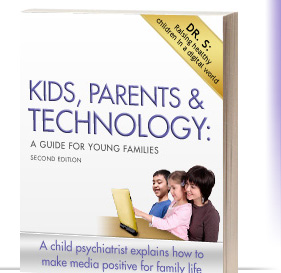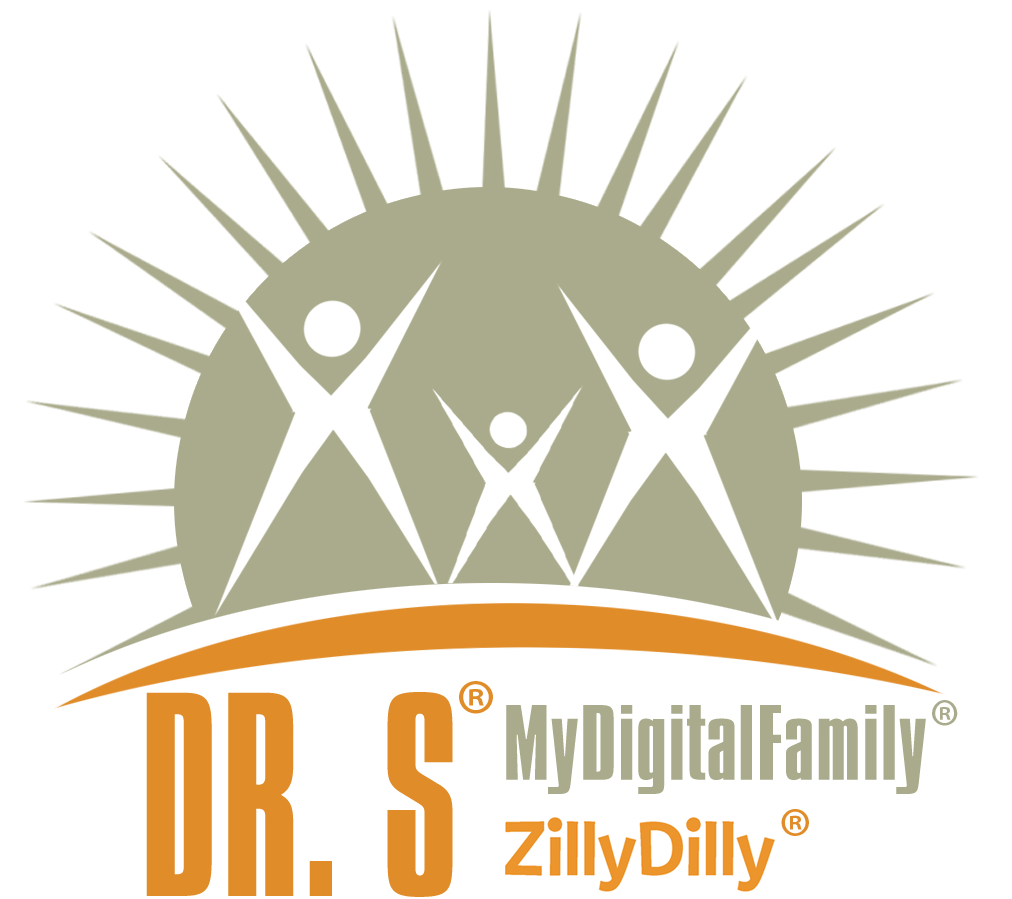Originally Published by ThinkerMedia: BestThinking.com on November 6, 2009
By applying sound child-rearing and family support principles, parents can now create balanced media diets that lead youngsters to the values and orientation they will need to succeed in an increasingly media-rich world.
The following is an excerpt from my book, Media, Kids and Technology: An Instruction Manual for Young Families, a comprehensive and practical child- or family-centered instruction manual offering step-by-step instructions on how to turn digital media into powerful parenting tools that enrich family life.
The instruction manuals we receive with digital media devices don’t teach parents the most important things — how to use the new gadgets to fully benefit youngsters and family lives. By applying sound child-rearing and family support principles, parents can now create balanced media diets that lead youngsters to the values and orientation they will need to succeed in an increasingly media-rich world. Ever-evolving technologies are bringing new opportunities into our homes at an astounding pace. Do we really want strangers influencing our children in ways we even don’t know? Starting kids early on family-oriented media diets can prevent such a future.
We all recognize the allure and power of media. It is likely that without much planning on your part, media have already led to changes in your home life and in some of the ways you interact with your children. In general, the earlier you start making the healthy use of media a normal part of family life the more you will be doing to improve it now and in the future.
Recent studies in respectable journals suggest that media consumption among children is pervasive and that early childhood patterns persist into later years. One team concludes, “These children are growing up in a media-saturated environment with almost universal access to television, and a striking number have a television in their bedroom. Media and technology are here to stay and are virtually guaranteed to plan an ever-increasing role in daily life, even among the very young. Additional research on their developmental impact is crucial to public health.” Another team reports another study that the more time they spent watching TV, the less time children spent doing other things with family members, homework and creative play. Still another team from San Diego State University recently reported that high users of media at young ages are likely to remain high users when older.
GOOD FAMILIES MAKE BETTER BRAINS
Believe it or not, you are actually gradually programming circuits in your child’s brain every day. Let’s start at the beginning and review what we know. Of all creatures, mammals are the most developed socially, and we humans are the most developed of all mammals. What makes that possible is our human brain. Some scientists now believe that our brain is probably the most sophisticated object in the universe and that it has evolved primarily to enable us to live and survive with each other in social groups. Our brains did not evolve to do rocket science, but mostly to enable our survival with each other. Survival isolated in the wild does not require its complexity, but living with people in social groups does.
YOU OWN IT: TAKE IT AND KEEP IT
Becoming parents (and we are constantly becoming and re-becoming parents as our children grow) is actually a personal developmental journey for each of us. Studies even show that a new mother’s brain itself is changed for her new role. If we reflect back upon our pre-parent years, we can now appreciate how much we ourselves have evolved as persons. Going in, we had known that our mission as parents will be to work hard at loving our babies by providing them the best and safest emotional, psychological, and physical opportunities.
OK. This is how we start. Your must first get it very clear in your mind that you can and will make intelligent decisions and find ways to raise good kids in our technology-rich world.
Your first decision is to commit yourself to a new challenge: From now on, you will include managing your family and children’s media interactions within your overall idea of yourself as your family’s leader. Your will now be aiming at assuring that your children’s interactions with media become only assets to their growth and development.
JUMP RIGHT IN
SEARCH WORDS: furniture home computer children family
Here we come to another major shift we must make in our thinking that leads us to seriously consider moving the computer away from the wall – the spatial arrangement of the online family computer within a room and its impact on interactions among family members in your home. If we want to change how we use the online home computer, we must change how it is placed. Changing the positioning of people interacting with media, you quickly expand the role of the personal computer in your home to create a family computer that provides new opportunities.
BEING FULLY PRESENT TOGETHER IS THE GLUE
Being fully present together with the child means being actively and in the here and now fully attentive, connected, plugged, and tuned into the moment of being with the child. Being fully present with your baby is speaking, listening, smelling, touching and looking together. Parent-child interactions commonly involve doing for, doing to, and doing with each other. But as far as healthy emotional development goes, being fully present together is the most important component of these interactions. Social bonds and moral or ethical behaviors remain underdeveloped if parent are not sufficiently present to be with their children.
Article by Eitan ‘Dr. S®’ Schwarz, MD
©All rights reserved



Children, Parents, And Technology: Becoming A Successful Digital Family
Originally Published by ThinkerMedia: BestThinking.com on November 6, 2009
By applying sound child-rearing and family support principles, parents can now create balanced media diets that lead youngsters to the values and orientation they will need to succeed in an increasingly media-rich world.
The following is an excerpt from my book, Media, Kids and Technology: An Instruction Manual for Young Families, a comprehensive and practical child- or family-centered instruction manual offering step-by-step instructions on how to turn digital media into powerful parenting tools that enrich family life.
The instruction manuals we receive with digital media devices don’t teach parents the most important things — how to use the new gadgets to fully benefit youngsters and family lives. By applying sound child-rearing and family support principles, parents can now create balanced media diets that lead youngsters to the values and orientation they will need to succeed in an increasingly media-rich world. Ever-evolving technologies are bringing new opportunities into our homes at an astounding pace. Do we really want strangers influencing our children in ways we even don’t know? Starting kids early on family-oriented media diets can prevent such a future.
We all recognize the allure and power of media. It is likely that without much planning on your part, media have already led to changes in your home life and in some of the ways you interact with your children. In general, the earlier you start making the healthy use of media a normal part of family life the more you will be doing to improve it now and in the future.
Recent studies in respectable journals suggest that media consumption among children is pervasive and that early childhood patterns persist into later years. One team concludes, “These children are growing up in a media-saturated environment with almost universal access to television, and a striking number have a television in their bedroom. Media and technology are here to stay and are virtually guaranteed to plan an ever-increasing role in daily life, even among the very young. Additional research on their developmental impact is crucial to public health.” Another team reports another study that the more time they spent watching TV, the less time children spent doing other things with family members, homework and creative play. Still another team from San Diego State University recently reported that high users of media at young ages are likely to remain high users when older.
GOOD FAMILIES MAKE BETTER BRAINS
Believe it or not, you are actually gradually programming circuits in your child’s brain every day. Let’s start at the beginning and review what we know. Of all creatures, mammals are the most developed socially, and we humans are the most developed of all mammals. What makes that possible is our human brain. Some scientists now believe that our brain is probably the most sophisticated object in the universe and that it has evolved primarily to enable us to live and survive with each other in social groups. Our brains did not evolve to do rocket science, but mostly to enable our survival with each other. Survival isolated in the wild does not require its complexity, but living with people in social groups does.
YOU OWN IT: TAKE IT AND KEEP IT
Becoming parents (and we are constantly becoming and re-becoming parents as our children grow) is actually a personal developmental journey for each of us. Studies even show that a new mother’s brain itself is changed for her new role. If we reflect back upon our pre-parent years, we can now appreciate how much we ourselves have evolved as persons. Going in, we had known that our mission as parents will be to work hard at loving our babies by providing them the best and safest emotional, psychological, and physical opportunities.
OK. This is how we start. Your must first get it very clear in your mind that you can and will make intelligent decisions and find ways to raise good kids in our technology-rich world.
Your first decision is to commit yourself to a new challenge: From now on, you will include managing your family and children’s media interactions within your overall idea of yourself as your family’s leader. Your will now be aiming at assuring that your children’s interactions with media become only assets to their growth and development.
JUMP RIGHT IN
SEARCH WORDS: furniture home computer children family
Here we come to another major shift we must make in our thinking that leads us to seriously consider moving the computer away from the wall – the spatial arrangement of the online family computer within a room and its impact on interactions among family members in your home. If we want to change how we use the online home computer, we must change how it is placed. Changing the positioning of people interacting with media, you quickly expand the role of the personal computer in your home to create a family computer that provides new opportunities.
BEING FULLY PRESENT TOGETHER IS THE GLUE
Being fully present together with the child means being actively and in the here and now fully attentive, connected, plugged, and tuned into the moment of being with the child. Being fully present with your baby is speaking, listening, smelling, touching and looking together. Parent-child interactions commonly involve doing for, doing to, and doing with each other. But as far as healthy emotional development goes, being fully present together is the most important component of these interactions. Social bonds and moral or ethical behaviors remain underdeveloped if parent are not sufficiently present to be with their children.
Article by Eitan ‘Dr. S®’ Schwarz, MD
©All rights reserved